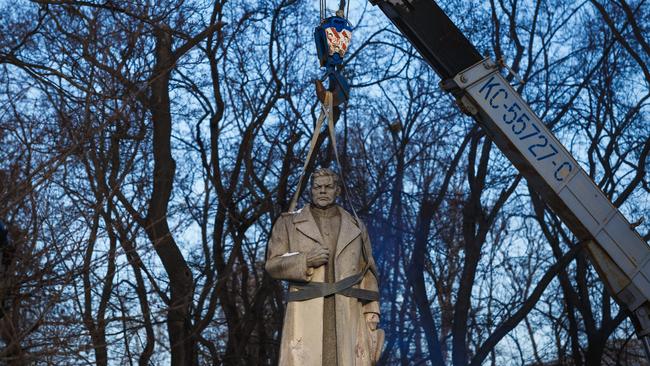Ukraine turns tables on Russian culture in these days of war and peace
Tchaikovsky on mute, Tolstoy pulped and Catherine the Great boxed up in basement - Putin’s invasion has triggered a cultural cull.

At Kyiv Opera House, dancers limbered up for a performance of The Snow Queen, a ballet created in Ukraine five years ago from the fairytale by Hans Christian Andersen.
Then, the medley piece was packed with the works of Russian composers that make up much of ballet’s classical canon. Now the work has been radically altered to excise Tchaikovksy and Prokofiev, making for an inventive melting pot of works pilfered from opera, foreign ballet and theatre, from Pietro Mascagni to Amilcare Ponchielli and Edvard Grieg.
“It was decided that Tchaikovsky is a symbol of Russian culture and Russian aggression, so we cannot support it,” the ballet’s director, Serhii Skuz, said.
“We don’t miss Tchaikovsky,” Anastasia Shevchenko, the ballerina dancing the part of the Snow Queen, insists. “Russia did this to Ukrainian culture and now the tables have turned. This is a chance for us to create something Ukrainian and new.”
Enthusiasm for Russian culture has been on the wane in Ukraine for years, since Moscow’s invasion of Crimea and the Donbas in 2014. But President Vladimir Putin’s full-scale invasion, drawn from his insistence that Ukraine does not exist as a separate country, has provoked a new backlash.
That, and a new and stronger sense of Ukrainian identity stoked by the war, are exactly the reverse of what the Kremlin intended during the imperial and the Soviet eras, as well as with the current effort to reabsorb Ukraine into Russia.
As fast as Russian troops move into occupied areas of Ukraine, re-erecting statues of Lenin dismantled after independence, Ukraine is removing monuments to the Russian and Soviet past. Every day statues are pulled down in front of cameras.
In Kyiv on Thursday it was the turn of Russian general Nikolai Vatutin, under whose command Kyiv was liberated from the Nazis in 1943.
Vatutin was killed by Ukrainian nationalist guerrillas a year later and buried in Mariinsky Park by what is now the Ukrainian parliament. His statue gone, his remains will now be disinterred and moved to a city cemetery. Last month, Odesa’s statue of Catherine the Great was taken down and put in a museum basement.
Almost 30 per cent of Ukrainians speak Russian as their first language and it was in their alleged defence that Putin justified his invasion. But more are turning their backs on their native tongue.
“Russification” as an imperial policy peaked under Alexander II, who banned all teaching, performing arts and literature in the Ukrainian language. Ukraine has not gone that far yet, though a law banning the import of literature from Russia and Belarus is already on the books.
In a vast, chilly warehouse on the outskirts of Kyiv, men in padded jackets and thick gloves stand on the edge of a truck, cutting open bundles of Russian books and throwing them on to a conveyor belt. A thick copy of Tolstoy’s War and Peace chugs its way up towards the pulping machine, followed by a leather-bound Russian-English dictionary.
Russian classics from Pushkin to Turgenev come after, along with Russian-language translations of Western fiction from Sidney Sheldon to Cecilia Ahern.
On top of a vast square of pulped literatures lies a copy of Dostoevsky’s The Insulted and Humiliated.
Much of the de-Russification has come from the bottom up, including the book-pulping project started by the Syayvo bookstore in response to customers asking, when it reopened three months after the invasion, whether it still sold Russian-language books.
Now it collects them from customers, schools and libraries and sends them to the recycling plant in return for payment that is channelled towards civilian and military charities.
Nadia Kibenko, 32, from Syayvo, rejects the idea that book pulping is akin to the kind of book burning reminiscent of the Third Reich.
“We do not destroy them, we just make them into something else,” she says.
Warehouse manager Andriy Mychka, 47, grew up forced to study in Russian. “It’s time for a new generation to move beyond the habits of Soviet times.”
The Times



To join the conversation, please log in. Don't have an account? Register
Join the conversation, you are commenting as Logout